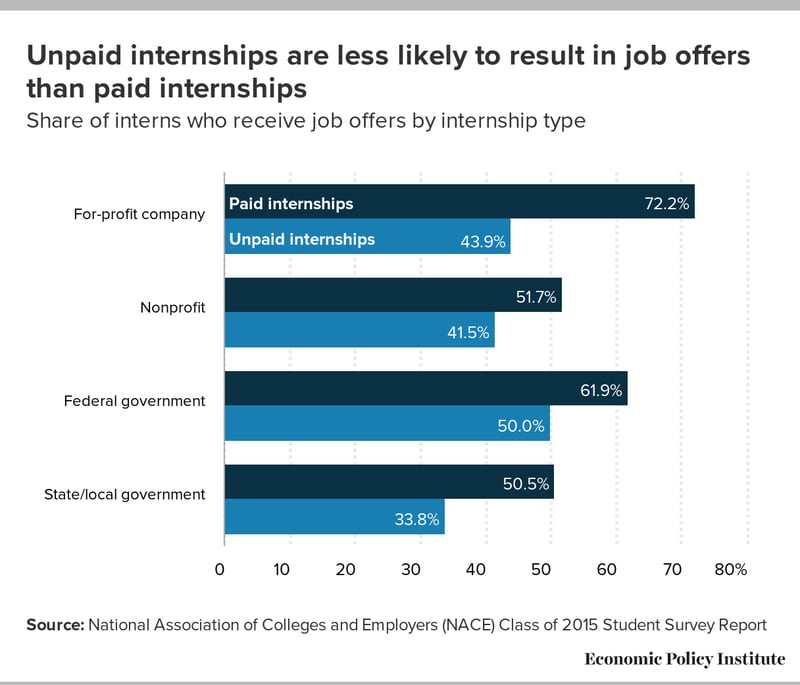As a college student, I never did any internships during the summer. I waitressed to earn spending and book money for school. Most of my friends also worked over the break. (I also worked at restaurants during the school year so I had both a steady source of income and food.)
When I went to graduate school, I was surprised how many of my Columbia University journalism school classmates had interned with major newspapers and TV stations in New York, LA, Boston or Washington. Typically, the students had attended colleges in big cities where internships were accessible or had personal contacts in the industries who opened doors. And they often had parents who could cover their living expenses as internships paid little or nothing back then.
The internships proved useful; classmates were often hired by the companies after they graduated. The rest of us found jobs but a rung or two down the career ladder or in small-town media markets.
Today, internships are more common. But I still find certain students go after them. Connections matter, whether through family or friends. And money matters as many students interning in New York fashion houses or Seattle music studios are only able to do so because their parents are footing the bills.
That reality has led to criticisms of internship programs, including a piece this week in The New York Times by Darren Walker, president of the Ford Foundation. Walker decries an internship system that often benefits the students who already enjoy an edge.
Walker writes: We often hear that success is "all about the people you know" — as if it's just a matter of equal-opportunity relationship building. We rarely talk about how one knows them, or about the privilege that has become a prerequisite to knowing the right people. I sometimes get calls and emails from friends seeking help in landing internships for their children. I understand what they're doing; this is part of being a parent. Still, it's a reminder that America's current internship system, in which contacts and money matter more than talent, contributes to an economy in which access and opportunity go to the people who already have the most of both.
Today, the Economic Policy Institute released a brief on a student survey on internships and jobs. The survey found:
Overall, an employer was far more likely to offer a job to a student prior to graduation if he or she had an internship or co-op — especially a paid position. The gap in offer rates between students with internship/co-op experience and those without such experience grew from 12.6 percent in 2011 to 20 percent in 2015 (56.5 percent versus 36.5 percent).
The survey examined student job offers, noting:
The difference in offer rates between paid and unpaid positions is evident across employer types, including nonprofit (51.7 percent vs. 41.5 percent), state/local government (50.5 percent vs. 33.8 percent), and federal government sectors (61.9 percent vs. 50 percent).
There was also a similar pattern in regard to starting salary offers. Having had a paid internship/co-op with a private, for-profit company yielded the highest median offer at $53,521, while the median offer for students who took unpaid internships/co-ops with a private, for-profit company was $34,375.
The same held true across industry sectors—nonprofit ($41,876 vs. $31,443), state/local government ($42,693 vs. $32,969), and federal government sectors ($48,750 vs. $42,501)
Here is a chart from EPI and the official summary:
Credit: Maureen Downey
Credit: Maureen Downey
It's internship season and offices across the country are filled with interns trying to make a good impression. Do internships lead to jobs? It depends. Evidence shows that paid internships lead to better employment outcomes than do unpaid internships. The National Association of Colleges and Employers (NACE) Student Survey Report provides troubling evidence that unpaid internships are associated with less success in the job market after graduation, both in terms of job offers and salary offers.
•College students who had an unpaid internship did significantly worse than students in paid internships, whether the job was non-profit, state, federal, or for-profit. The job offer rate for graduates who had taken a paid, for-profit internship was 72% vs. 44% for unpaid, for-profit internships .
•The NACE survey found that regardless of the sector, unpaid interns received lower salary offers than students who had taken a paid internship.
•Most notably, the median graduate who had taken an unpaid internship in a for-profit firm was offered $19,000 less than the median paid intern in such firms.
About the Author







